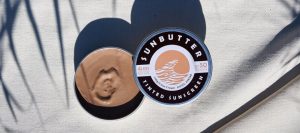Sunbutter Oceans was the very first plastic free TGA listed natural mineral sunscreen in Australia. It has an SPF50 rating and 4 hours water resistant making it a high performing product. There is also a tinted version that gives a warm bronze tone for those who find their skin tone is a little washed out with white zinc sunscreens and their Surf Zinc is now also listed with the TGA with an official SPF50 rating. Zinc is thicker and provides extra coverage for areas that burn quicker like noses, ears etc.
What's in Sunbutter Sunscreen?
Sunbutter Sunscreens are made with a vegan formula, in Australia. The active ingredients are non nano zinc oxide, and the inactive ingredients include natural ingredients like MCT (coconut oil derived), castor oil, coconut oil, candelilla wax, isostearic acid (which is a plant based binder), and vitamin E. These natural ingredients make it a suitable formula for all, including those with sensitive skin and suits most skin types.
What coverage does Sunbutter sunscreen provide?
High level sun protection in the form of SPF50 comes through broad spectrum uva and uvb coverage via the active ingredient, non nano zinc oxide. Natural sunscreen is best applied 20 minutes prior to sun exposure and reapplied after swimming or excessive sweating. It is water resistant for up to 4 hours. When using a mineral sunscreen, it is formulated to create a barrier on the skin and reflects the uva and uvb rays away from the skin. Ensure you apply enough and rub it in evenly for proper protection.
What's the difference between the original and the tinted Sunbutter sunscreen?
White mineral sunscreens are known to sometimes leave a white cast on the skin. While most people going to the beach aren't concerned with this, if you're putting on sunscreen and going to work or you're at an outdoor event, you may look a little pale. Matching natural skin tones with a tinted option is a better choice for many, just be mindful that the tinted version is using pigmented minerals, and like a mineral foundation, can stain clothes.
How to look after your Sunbutter Sunscreen tin
Creating a natural sunscreen in a tin and not a plastic tube does create some challenges, especially if you're going to reapply your sun protection at the beach. This plastic free packaging needs just a little TLC to keep it clean and avoid mess. If you're using it at the beach, periodically wipe the thread of both the lid and the base to ensure sand & grit doesn't make its way into the sunscreen and to ensure you can get the lid securely closed without spillage while travelling. Store it flat wherever possible and under 30 degrees (which you should do for all sunscreen). If you're at the beach with a cold drink, food and a cooler bag with an ice pack, pop your sunscreen in to keep it cool. If you can't keep it cool and flat, consider decanting a small amount of your sunscreen into something smaller.
Sunbutter Sunscreen is POFCAP certified
A world first, Sunbutter is the world's first certified palm oil free sunscreen with the POFCAP, who own the Palm Oil Free Certification Trademark. Sunbutter worked with POFCAP and the Orangutan Alliance to ensure their supply chain was completely free of palm oil. And it's not just their sunscreen range. Every product the brand produces is also palm oil free. Many products in our store are industry verified only, but Sunbutter is certified.
Is Sunbutter Reef Safe?
Yes it is. The phrase reef safe sunscreen is used to describe mineral sunscreens like Sunbutter that do not use chemical blockers like oxybenzone and octinoxate that are found in chemical sunscreens.
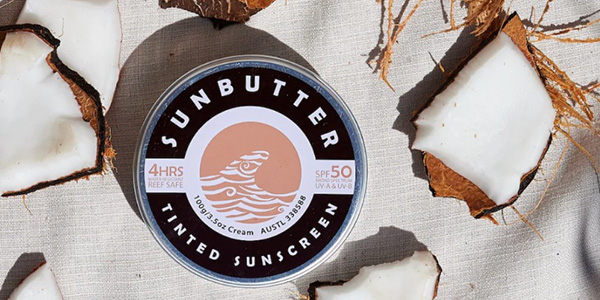

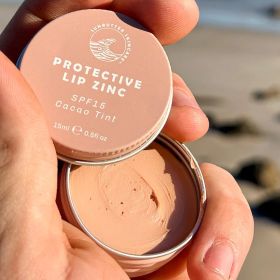 Sunbutter Protective Lip Zinc Cacao Tint SPF15 15mlNourishing 'use me all day' tinted lip zinc formula to protect the lips. Palm oil free.OUT OF STOCK$22.95
Sunbutter Protective Lip Zinc Cacao Tint SPF15 15mlNourishing 'use me all day' tinted lip zinc formula to protect the lips. Palm oil free.OUT OF STOCK$22.95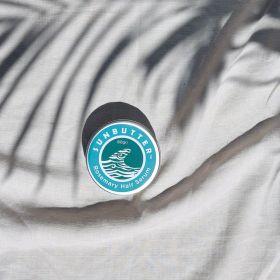 Sunbutter Rosemary Hair Serum for Salty Locks 80gThis is a rich serum to be applied to ends of hair before swimming in the ocean or pools. Or apply as mask and leave in for several hours befo...OUT OF STOCKSpecial Price $22.95 Regular Price $32.95
Sunbutter Rosemary Hair Serum for Salty Locks 80gThis is a rich serum to be applied to ends of hair before swimming in the ocean or pools. Or apply as mask and leave in for several hours befo...OUT OF STOCKSpecial Price $22.95 Regular Price $32.95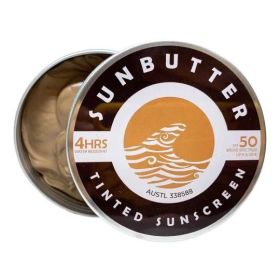 Sunbutter Natural Tinted Sunscreen SPF50 100gThe formula you love is now tinted. Plastic free, vegan, SPF50, reef safe, palm oil free and rated 4 hours water resistant.OUT OF STOCKSpecial Price $23.95 Regular Price $31.95
Sunbutter Natural Tinted Sunscreen SPF50 100gThe formula you love is now tinted. Plastic free, vegan, SPF50, reef safe, palm oil free and rated 4 hours water resistant.OUT OF STOCKSpecial Price $23.95 Regular Price $31.95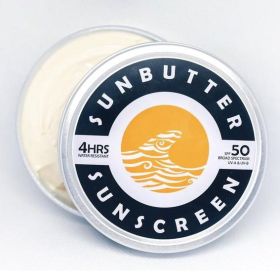 Sunbutter Natural Sunscreen SPF50 100gPlastic free, vegan, SPF50, reef safe, palm oil free and rated 4 hours water resistant all in a reusable tin.OUT OF STOCK$29.95
Sunbutter Natural Sunscreen SPF50 100gPlastic free, vegan, SPF50, reef safe, palm oil free and rated 4 hours water resistant all in a reusable tin.OUT OF STOCK$29.95